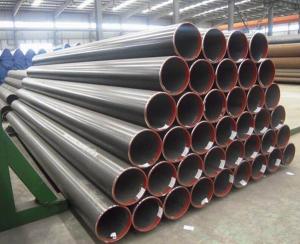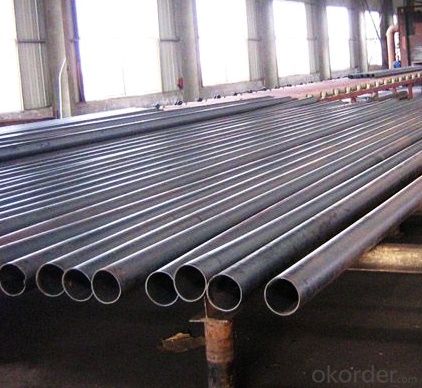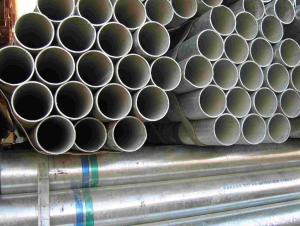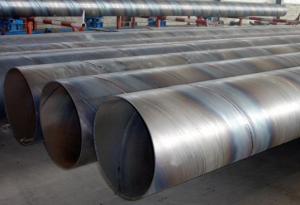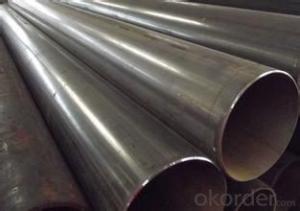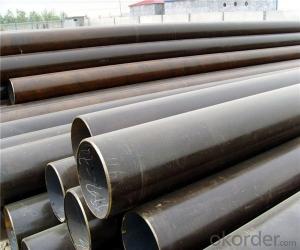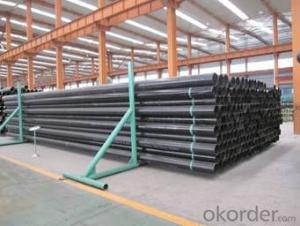A variety of hot ERW welded steel pipe you can find
- Loading Port:
- Tianjin
- Payment Terms:
- TT or LC
- Min Order Qty:
- 25 m.t.
- Supply Capability:
- 10000 m.t./month
OKorder Service Pledge
OKorder Financial Service
You Might Also Like
1、Structure of ERW Black Steel Pipe:
ERW Black Steel Pipe is formed by drawing a solid billet over a piercing rod to create the hollow shell. As the manufacturing process does not include any welding, seamless pipes are perceived to be stronger and more reliable. Historically seamless pipe was regarded as withstanding pressure better than other types, and was often more easily available than welded pipe.
2、Main Features of ERW Black Steel Pipe:
• High manufacturing accuracy
• High strength
• Small inertia resistance
• Strong heat dissipation ability
• Good visual effect
• Reasonable price
3、ERW Black Steel Pipe Specification:
Standard | GB, DIN, ASTM ASTM A106-2006, ASTM A53-2007 |
Grade | 10#-45#, 16Mn 10#, 20#, 45#, 16Mn |
Thickness | 8 - 33 mm |
Section Shape | Round |
Outer Diameter | 133 - 219 mm |
Place of Origin | Shandong, China (Mainland) |
Secondary Or Not | Non-secondary |
Application | Hydraulic Pipe |
Technique | Cold Drawn |
Certification | API |
Surface Treatment | factory state or painted black |
Special Pipe | API Pipe |
Alloy Or Not | Non-alloy |
Length | 5-12M |
Outer Diameter | 21.3-610mm |
Grade | 20#, 45#, Q345, API J55, API K55, API L80, API N80, API P110, A53B |
Standard | ASME, ASTM |
1) Material:20#(ASTM A 106/A53 GRB.API5LGRB,GB),45#,16Mn,10#.
2) Specification range:OD:21.3-610mm,WT:6-70mm,length:6-12m or according to the requirement of clients.
3) Excutive standards:GB,ASME API5L.ASTM A 106/A53,Despite of the above standards,we can also supply seamless steel pipe with standard of DIN,JIS,and so on,and also develop new products according to the requirements of our clients!
4) Surface:black lacquered,varnish coating or galvanized.
5) Ends:Beveled or square cut,plastic capped,painted.
6) Packing:bundles wrapped with strong steel strip,seaworthy packing.
4、Packaging & Delivery
Packaging Details: | seaworthy package,bundles wrapped with strong steel strip |
Delivery Detail: | 15-30days after received 30%TT |
5、FAQ of ERW Black Steel Pipe:
①How is the quality of your products?
Our products are manufactured strictly according to national and internaional standard, and we take a test
on every pipe before delivered out. If you want see our quality certifications and all kinds of testing report, please just ask us for it.
Guaranteed: If products’ quality don’t accord to discription as we give or the promise before you place order, we promise 100% refund.
②How about price?
Yes, we are factory and be able to give you lowest price below market one, and we have a policy that “ for saving time and absolutely honest business attitude, we quote as lowest as possible for any customer, and discount can be given according to quantity”,if you like bargain and factory price is not low enough as you think, just don’t waste your time.Please trust the quotation we would give you, it is professional one.
③Why should you chose us?
Chose happens because of quality, then price, We can give you both.Additionally, we can also offer professional products inquiry, products knowledge train(for agents), smooth goods delivery, exellent customer solution proposals.Our service formula: good quality+good price+good service=customer’s trust
6、ERW Black Steel Pipe Images:
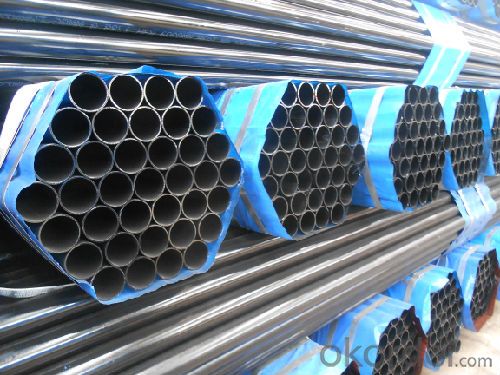
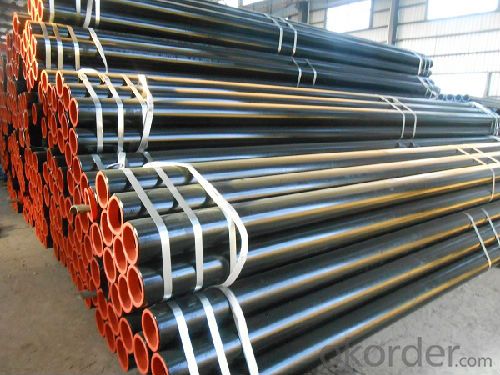
- Q: What is the role of steel pipes in the construction of bridges and tunnels?
- The construction of bridges and tunnels heavily relies on steel pipes, which are widely used for various purposes due to their strength, durability, and versatility. When it comes to bridge construction, steel pipes are commonly utilized to fabricate the structural framework of the bridge. They act as the primary load-bearing members, providing support and stability to the entire structure. Steel pipes are particularly favored in bridge construction because of their high tensile strength, enabling them to withstand heavy loads, including the weight of vehicles and the dynamic forces generated by traffic. Steel pipes are also essential in the construction of bridge piers and abutments, which serve as the foundation and support for the bridge structure. To create sturdy foundations that can withstand the forces exerted by the bridge's weight and external factors such as wind, water currents, and seismic activity, steel pipes are often driven deep into the ground. Similarly, in tunnel construction, steel pipes play a critical role. They are extensively used for tunnel lining, which involves the installation of structural elements along the tunnel walls and roof to ensure stability and prevent soil or rock collapse. Steel pipes are commonly used as reinforcement elements, ensuring the structural integrity of the tunnel and protecting it from external pressures. Furthermore, steel pipes are utilized for underground utility systems in both bridges and tunnels. They act as conduits for various utilities, including water supply, electrical cables, gas pipelines, and communication lines. Steel pipes are ideal for these applications because of their corrosion resistance, ability to withstand high pressures, and long lifespan. In conclusion, steel pipes are crucial in the construction of bridges and tunnels as they provide strength, stability, and durability to these structures. They play a vital role in ensuring the safety and functionality of these critical infrastructure projects, allowing for efficient transportation and the seamless provision of utilities.
- Q: How do you prevent freezing in steel pipes during cold weather?
- To prevent freezing in steel pipes during cold weather, there are several measures that can be taken: 1. Insulate the pipes: Insulation is an effective way to protect steel pipes from freezing. Use insulation sleeves or wraps to cover the pipes, especially in areas where they are exposed to cold temperatures. Insulation helps retain heat and prevents the pipes from reaching freezing temperatures. 2. Seal any air leaks: Check for any gaps or openings around the pipes where cold air can enter. Use caulking or weatherstripping to seal these gaps and prevent cold air from reaching the pipes. 3. Maintain a consistent temperature: Ensure that the area where the pipes are located is adequately heated and insulated. Keeping the temperature above freezing will help prevent the pipes from freezing. If the pipes are exposed to extremely low temperatures, consider using heat tape or pipe heating cables to provide additional warmth. 4. Allow water to flow: Running a small, continuous trickle of water through the pipes can help prevent freezing. The flowing water generates heat and inhibits the formation of ice within the pipes. However, this method should only be used as a last resort, as it can waste water. 5. Drain the pipes: If the steel pipes are in an area that is not regularly used or if freezing weather is expected, it may be advisable to drain the pipes completely. Turn off the water supply and open all faucets to allow the water to drain out. This eliminates any standing water that could freeze and cause the pipes to burst. It is important to note that prevention is key, as frozen steel pipes can lead to costly damages and water leaks. By implementing these measures, you can protect your steel pipes and ensure they remain functional during cold weather.
- Q: What are the common methods for repairing steel pipes?
- Some common methods for repairing steel pipes include welding, pipe wrapping, pipe relining, and pipe bursting.
- Q: What's the actual size of the DN25?
- Different materials of steel pipe, nominal diameter of the same, then its outer diameter is the same, diameter = outside diameter -2 times, wall thickness.
- Q: How are steel pipes used in the manufacturing of marine applications?
- Steel pipes are commonly used in the manufacturing of marine applications due to their durability and resistance to corrosion. They are used for various purposes such as constructing ship hulls, offshore platforms, and underwater pipelines. These pipes provide structural support and can withstand the harsh conditions of the marine environment, making them essential components in the manufacturing process of marine applications.
- Q: What are the common uses of steel pipes in construction?
- Due to their durability and strength, steel pipes are widely used in construction for various purposes. Plumbing systems in buildings commonly rely on steel pipes, which can effectively transport water, gas, and other fluids. Their resistance to corrosion and ability to withstand high pressure make them the preferred choice over alternative materials. Steel pipes are also frequently employed for structural support in construction. They serve as columns or beams, providing buildings with structural integrity and stability. With their capacity to support heavy loads, steel pipes are highly favored in the construction industry. Bridges and highways often incorporate steel pipes into their design. They are utilized to create sturdy and long-lasting bridge supports, guardrails, and signposts. The ability of steel pipes to endure extreme weather conditions and heavy traffic makes them a reliable option for infrastructure projects. Additionally, steel pipes are indispensable for underground utilities like sewer and drainage systems. They offer a robust solution for transporting wastewater and preventing leaks. Moreover, they play a crucial role in constructing underground tunnels and pipelines. Furthermore, steel pipes find application in fencing, scaffolding, and handrails in construction. Their strength, versatility, and ability to withstand harsh environmental conditions make them a preferred choice. In summary, steel pipes are vital components in construction due to their numerous advantages. Their durability, strength, and resistance to corrosion make them a reliable choice for various applications in the construction industry.
- Q: What are the different types of steel pipe coatings for drinking water pipelines?
- There are several types of steel pipe coatings used for drinking water pipelines, including fusion bonded epoxy (FBE), polyurethane (PU), and polyethylene (PE). These coatings provide corrosion protection, prevent leaching of contaminants into the water, and ensure the durability of the pipes.
- Q: How are steel pipes protected against internal corrosion?
- Steel pipes are protected against internal corrosion through the use of various methods such as coating the inner surface with corrosion-resistant materials, applying chemical inhibitors to the fluid being transported, and implementing cathodic protection systems.
- Q: What are the different types of joints used in steel pipes?
- There are several types of joints commonly used in steel pipes, including threaded joints, welded joints, flanged joints, and grooved joints.
- Q: Can steel pipes be bent or shaped to meet specific requirements?
- Yes, steel pipes can be bent or shaped to meet specific requirements through various techniques such as hot bending, cold bending, or using specialized machinery like pipe benders.
Send your message to us
A variety of hot ERW welded steel pipe you can find
- Loading Port:
- Tianjin
- Payment Terms:
- TT or LC
- Min Order Qty:
- 25 m.t.
- Supply Capability:
- 10000 m.t./month
OKorder Service Pledge
OKorder Financial Service
Similar products
Hot products
Hot Searches
Related keywords
